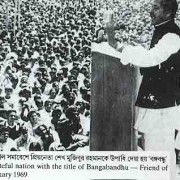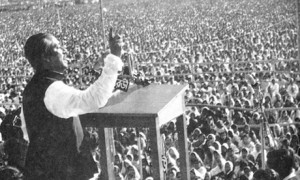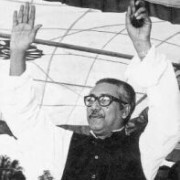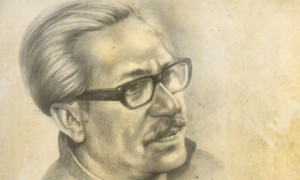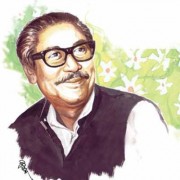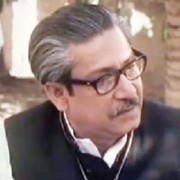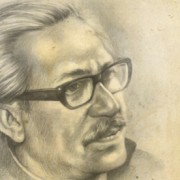প্রকাশনাসমূহ
Bangabandhu Sheikh Mujibur Rahman’s speech to the 1st batch of Bangladesh Military Academy
/in Articles, Videos /by rrajowanRemembering August 15, 1975
/in A Brief, Articles, History /by rrajowan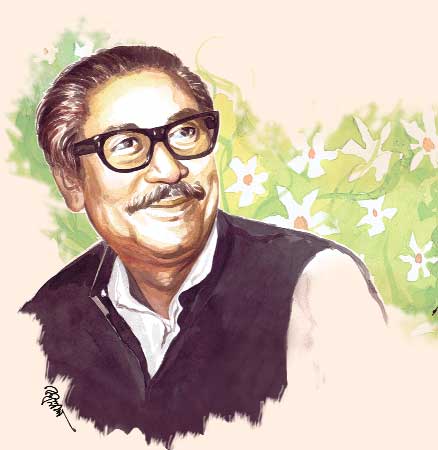 Darkness settled in seemingly with a promise to facilitate a peaceful slumber for the city dwellers after a hot day’s tiring work. There was nothing uncanny in the bearing of the night, except that it was completely oblivious of what Cassius and a few villains were conspiring to execute under cover of the night’s darkness. These villains committed the gravest ever crime that people will always remember with hatred and acute ache in their hearts. An indelible smear desecrated the otherwise laudable history of Bangladesh.
Darkness settled in seemingly with a promise to facilitate a peaceful slumber for the city dwellers after a hot day’s tiring work. There was nothing uncanny in the bearing of the night, except that it was completely oblivious of what Cassius and a few villains were conspiring to execute under cover of the night’s darkness. These villains committed the gravest ever crime that people will always remember with hatred and acute ache in their hearts. An indelible smear desecrated the otherwise laudable history of Bangladesh.
The serenity of the night was shattered by the boot-steps of the shadows of uniformed personnel, climbing up the stairs in our building in Sukrabad, just a few minutes’ walk from Sheikh Mujib’s residence, across Mirpur Road. I gathered the courage to crane my neck through one of the open windows, only to be rebuffed by a soldier, growling at me, to be quiet and to get back to sleep. Tension bristled across the room, and anxiety paled the faces of other members of my family. Muffled whispers ensued, and in spite of me being extremely worried, I had to pacify others inside the room, by saying that it was nothing important. I advised them to retire to their respective beds, but kept my ears alert for sensing any untoward noise. Before long, war noises started to pound our hearts, which drove me to the end of my wits. It took a few moments before I could regain my composure. Immediately everyone in the house was asked to prostrate on the floor to avoid any bullet hitting us.
Sporadic reports of the guns and tanks kept the anxiety mounting in every mind, and a refreshing sleep was denied. We were still in the dark about what was happening in Sheikh Mujib’s residence, on the other side of the road. People in the houses around were all awake but none dared to go out to find out what was happening. The tiring, sleepless night was finally over and the remorseful morning dawned to expose the unthinkable crime that had been committed in the sanctified land of Bangladesh. As the armed shadows, guarding on the rooftop, vanished into nothing, curiosity overtook me. I just cantered along the alley to reach an under-construction building. Reaching the top floor offered me an uninterrupted view along Mirpur Road from beyond Kalabagan to Asadgate. Completely deserted, the road was burning in the scorching heat of the sun. A car was left abandoned near Sobhanbag mosque, with four of its doors flung open and two human hands drooping on one side of the car, which gave me to understand that a dead body was lying inside. The tanks and artillery were placed somewhere on Manik Mia Avenue. Every few minutes an army jeep chased shadows along the road to apprehend the fugitive who, they might have thought, could appear from nowhere to resist their crime.
As I gathered later, guns and tanks were stationed in some strategic places to deter people from coming together to protest the dubious activities of the uniformed people. The streets remained deserted and Dhaka University, which was waiting to welcome the undisputed leader of Bangladesh to its convocation, was made off limits for the public by the heavy armed vehicles of the defense forces. People remained indoors, extremely anxious to hear what had happened in the darkness of the night. Speculations and rumours were a murderous presence in every nook and cranny. Nothing was authentic, and an unbearable uncertainly pervaded every mind.
It was close to nine in the morning when the perpetrators made their sinister act known to the public through a radio announcement, sending thousands across the country into shedding tears hysterically. The heartbreaking news was initially rejected by many as a kind of concoction of some ill-motivated uniformed personnel, but soon the truth dawned on all that the great leader was no longer alive. My old mother wept profusely. I tried to console her, but between sobs she uttered, “Why do they have to kill him?” This incident occurred at a time when I was a first year student of Dhaka University. It affected me so much that the hatred that gathered in my mind has never ceased to curse the killers. The solemn prayer of my mother for the salvation of the great leader’s soul still rings in my ears. My mother, although she did not understand much of politics, had a tremendous affection for Sheikh Mujib. Her prayers for the fallen hero will never go unrewarded. August 15, 1975 has taken our leader to his peaceful abode in heaven, it has also inscribed his name in letters of gold in millions of hearts which will never be erased.
Now that this day of mourning has once more traversed its annual course, people need to be united to subdue the evil forces of darkness that caused this bloodbath. Those who are responsible for the crime and those who are the beneficiaries are to be brought to book. Our posterity needs to learn the truth about the killings. We must also tell our children how the anti-liberation forces, under the cover of religion, have been distorting the facts about our great leader, and poisoning their innocent minds with fabricated stories about him. It is for the sake of truth that Bangabandhu Sheikh Mujibur Rahman’s unselfish devotion to the people and the country should be projected, with all honesty and sincerity. It is for the betterment of the nation that all perpetrators of the crime of his assassination be brought to face justice. Only then can we expect to develop a prosperous Bangladesh, free from all sorts of injustice.
Author : – Muhammad Abdul Hai
Bangabandhu Random Videos
/in Videos /by rrajowanBangabandhu Random Videos Play list from the house of
i-Bangla Limited.
[youtube]PLGCzqDkvZTYy1LLYxdTlMkOECV__Q2Xnq[/youtube]
The Declaration of Independence
/in A Brief, Articles, Biography, History, Political Career /by RonZ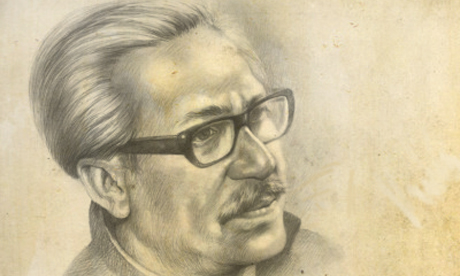 The 7th March speech of Bangabandhu was the definitive commencement of Liberation war. The independence of Bangladesh was declared by Sheikh Mujibur Rahman through a message on 26 March 1971 just before he was arrested at about 1:30 a.m. This declaration of independence marks the beginning of the Liberation War.
The 7th March speech of Bangabandhu was the definitive commencement of Liberation war. The independence of Bangladesh was declared by Sheikh Mujibur Rahman through a message on 26 March 1971 just before he was arrested at about 1:30 a.m. This declaration of independence marks the beginning of the Liberation War.
“This may be my last message, from today Bangladesh is independent. I call upon the people of Bangladesh wherever you might be and with whatever you have, to resist the army of occupation to the last. Your fight must go on until the last soldier of the Pakistan occupation army is expelled from the soil of Bangladesh and final victory is achieved.”
Bangabandhu spread the declaration and was reached to many. The wife of M.R. Siddiqi was given an urgent message over telephone from Bangabandhu received through the wireless operators of Chittagong. [ Sheikh Mujib: Triumph and Tragedy by S. A. Karim]
DECLARATION OF INDEPENDENCE FROM KALURGHAT (March 26, 1971):
Soon after the Pakistani army crackdown on the night of March 25, 1971,the first declaration of independence was made over the radio by M. A. Hannan.
According to the English language newspapers from around the flashed around the world on news wires on the evening of March 26, 1971 and the world came to know about the independence of Bangladesh from Sheikh Mujibur Rahman’s original message received in Calcutta on the morning of March 26 and from broadcasts from Swadhin Bangla Betar Kendro on the evening of March 26.
The following world press also reported on 26th March:
The Statesman and The Times of India from India; Buenos Aires Herald from Argentina; The Age, The Sydney Morning Herald from Australia; The Guardian from Burma; The Globe and Mail from Canada; Hong Kong Standard from Hong Kong; The Jakarta Times from Indonesia; Asahi Evening News from Japan; The Rising Nepal from Nepal; The Manila Times from the Philippines; The Straits Times from Singapore; The Pretoria News from South Africa; The Bangkok Post from Thailand; The Daily Telegraph, The Guardian, The Times of London from the United Kingdom; and, Baltimore Sun, The Boston Globe, Chicago Tribune, Christian Science Monitor, Los Angeles Times, The New York Times, The Philadelphia Inquirer, San Francisco Chronicle and The Washington Post from the United States.
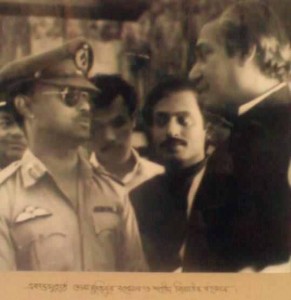 Bangabandhu dictated the declaration through telegram, A telegram containing the text of Sheikh Mujibur Rahman’s declaration reached some students in Chittagong. The message was translated to Bangla by Dr. Manjula Anwar. The students failed to secure permission from higher authorities to broadcast the message from the nearby Agrabad Station of Radio Pakistan.
Bangabandhu dictated the declaration through telegram, A telegram containing the text of Sheikh Mujibur Rahman’s declaration reached some students in Chittagong. The message was translated to Bangla by Dr. Manjula Anwar. The students failed to secure permission from higher authorities to broadcast the message from the nearby Agrabad Station of Radio Pakistan.
The Kalurghat Radio Station’s transmission capability was limited, but the message was picked up by a Japanese ship in Bay of Bengal. It was then re-transmitted by Radio Australia and later by the British Broadcasting Corporation.
Announcement of the declaration of independence:
Awami League leader M.A. Hannan aired the declared the independence on behalf of Bangabandhu : (Signed by Bangabandhu):
Abul Kashem Sandeep translated the message to broadcast.
“Today Bangladesh is a sovereign and independent country. On Thursday night West Pakistani armed forces suddenly attacked the police barracks at Razarbagh and the EPR headquarters at Pilkhana in Dhaka. Many innocent and unarmed have been killed in Dhaka city and other places of Bangladesh. Violent clashes between EPR and Police on the one hand and the armed forces of Pindi on the other, are going on. The Bengalis are fighting the enemy with great courage for an independent Bangladesh. May God aid us in our fight for freedom. Joy Bangla.”
Pakistani sources:
Siddiq Salik had written that he heard about Mujibor Rahman’s message on the radio while Operation Searchlight was going on. [ “Witness to Surrender” ]
The Statesman published from New Delhi on March 27, 1971 and explained the two messages received on March 26:
Sheikh Mujibur Rahman made two broadcasts on Friday following the Pakistani troops move to crush his movement, says UNI.
Announcement of the declaration of independence by Major Zia on behalf of Bangabandhu, There are Major Zia declared the independence on behalf of Sheikh Mujibur Rahman.
# Maj. Gen. Hakeem A. Qureshi in his book The 1971 Indo-Pak War: A Soldier’s Narrative, gives the date of Zia’s speech as 27 March 1971.
# MASSACRE by Robert Payne, Publisher : The McMillan Company New York.
# J. S. Gupta The History of the Liberation Movement in Bangladesh
# India, Pakistan, and the United States: Breaking with the Past By Shirin R. Tahir-Kheli ISBN 0-87609-199-0, 1997, Council on Foreign Relations. pp 37
Major Zia’s declaration of independence on behalf of Bangabandhu was made controversial over an Very few people heard this declaration and Major Zia’s famous “Ami Major Zia Bolchhi”.
“Our struggle is for our freedom. Our struggle is for our independence.” The speech is regarded as the de facto declaration of independence although a formal declaration came on March 26, 1971
Our history has undergone huge twist at the hands of vested quarters. Some people claim that Zia declared himself as provisional commander in chief. In fact Zia made two speeches. When this unauthorized speech created confusion among the people, the Awami League leaders asked Zia to read out a text prepared by A. K. Khan.
Zia followed the suggestion, and made a second speech, where he mentioned that he was speaking on behalf of our great national leader Bangabandhu Sheikh Mujibur Rahman.
Announcement
The government of theSoverignStateon behalf of our great national leader, the supreme commander ofBangladeshSheikh Mujibur Rahman, do hereby proclaim the independence ofBangladesh. And that the government headed by Sheikh Mujibur Rahman has already been formed. It is further proclaimed that Sheikh Mujibur Rahman is the sole leader of the elected representatives of seventy five million people ofBangladesh, and the government headed by him is the only legitimate government of the people of the independent soverign state ofBangladesh….
It was impractical to think of the declaration of independence without mentioning name of Bangabandhu. His name carries more value than any political party. The sky is the limit to measure the popularity of Sheikh Mujib and the landslide victory of 70’s election was its reflection only.
Zia read out the declaration on behalf of Bangbanandhu. Formation of Mujib Nagar Government carries the historic significance.
Bangabandhu’s Declaration of Independence. (Reserved in Liberation War Museum, Segun Bagicha, Dhaka)
Telex Copy of Bangabandhu’s Declaration of Independence
Untitled
 The Day make the victory completeমে 10, 2019 - 8:43 অপরাহ্ন
The Day make the victory completeমে 10, 2019 - 8:43 অপরাহ্ন “Bangabandhu” – An illustrious leaderমার্চ 30, 2018 - 8:06 অপরাহ্ন
“Bangabandhu” – An illustrious leaderমার্চ 30, 2018 - 8:06 অপরাহ্ন Unesco recognises Bangabandhu’s 7th March speechঅক্টোবর 31, 2017 - 12:15 অপরাহ্ন
Unesco recognises Bangabandhu’s 7th March speechঅক্টোবর 31, 2017 - 12:15 অপরাহ্ন National Mourning Day observedআগস্ট 16, 2016 - 12:39 পূর্বাহ্ন
National Mourning Day observedআগস্ট 16, 2016 - 12:39 পূর্বাহ্ন National Mourning Day todayআগস্ট 15, 2016 - 1:43 অপরাহ্ন
National Mourning Day todayআগস্ট 15, 2016 - 1:43 অপরাহ্ন
L A T E S T
Political Career
 Bangabandhu had no illusions about Pakistanisআগস্ট 15, 2016 - 12:44 পূর্বাহ্ন
Bangabandhu had no illusions about Pakistanisআগস্ট 15, 2016 - 12:44 পূর্বাহ্ন HIS GREATNESS CANNOT BE TARNISHEDএপ্রিল 14, 2015 - 8:03 অপরাহ্ন
HIS GREATNESS CANNOT BE TARNISHEDএপ্রিল 14, 2015 - 8:03 অপরাহ্ন THE STORY OF AN INSPIRATIONAL FIGUREজানুয়ারি 17, 2014 - 2:20 অপরাহ্ন
THE STORY OF AN INSPIRATIONAL FIGUREজানুয়ারি 17, 2014 - 2:20 অপরাহ্ন The Declaration of Independenceজুন 6, 2013 - 5:49 অপরাহ্ন
The Declaration of Independenceজুন 6, 2013 - 5:49 অপরাহ্ন The day they killed Bangabandhuজুন 6, 2013 - 5:34 অপরাহ্ন
The day they killed Bangabandhuজুন 6, 2013 - 5:34 অপরাহ্ন

